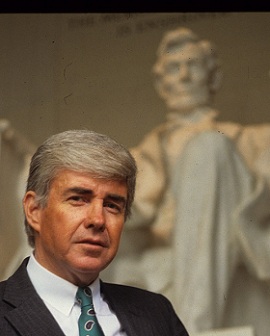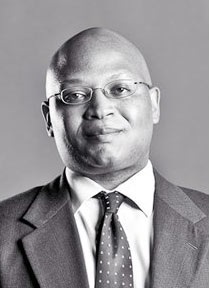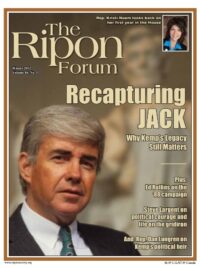
On April 6, 1987, a 51-year old Republican from Buffalo, New York launched a bid to become the first Congressman elected President since James Garfield in 1880.
His name was Jack Kemp, and his campaign for the White House lasted a mere 339 days. He exited the race on Super Tuesday in 1988, succumbing to a better-financed and much better known opponent in then-Vice President George H.W. Bush.
And yet for many Republicans then, and many Republicans today, Kemp’s quest for the presidency remains something of a high water mark in their political lives – a moment when conservatism and progressivism came together in a campaign that sought not only to fulfill Ronald Reagan’s vision of America, but to expand and build upon it, too.
It was a campaign geared around inclusion, growth and opportunity, and one that actively reached out to union members, minorities and other non-traditional GOP constituencies in search of votes. And at its center was Kemp, the son-of-a-truck-driver-turned-football hero-turned-U.S. Representative who would become one of the greatest warriors the American conservative movement has ever known.
A devout believer in supply-side economics and a proud protector of the unborn, he was also one of the unsung heroes of the post-1960s civil rights movement, a man who fought to ensure that the GOP would remain the party of Lincoln. Three years after his untimely death at the age of 73 and twenty-five years after his unsuccessful campaign for the Presidency, Kemp’s legacy still resonates.
First and foremost, Kemp was a conservative evangelist, taking the message of free markets and free people to every corner of the country.
And what is his legacy?
First and foremost, Kemp was a conservative evangelist, taking the message of free markets and free people to every corner of the country. In his mind, conservatism was a philosophy that could be understood and embraced by virtually every American. Kemp was driven by his recognition that the welfare state sabotaged the American Dream. He noted in a 1990 Wall Street Journal piece that America:
“…is separated or divided into two economies. One economy—our mainstream economy—is democratic and capitalist, market-oriented and entrepreneurial…[But] there is another economy—a second economy that is similar in respects to the East European or Third World socialist economies. It functions in a fashion opposite to the mainstream capitalist economy. It predominates in the pockets of poverty throughout urban and rural America. This economy has barriers to productive human and social activity and a virtual absence of economic incentives and rewards. It denies black, Hispanic and other minority men and women entry into the mainstream. This economy works almost as effectively as did hiring notices 50 years ago that read ‘No Blacks—or Hispanics or Irish or whatever—Need Apply.’ The irony is that the second economy was born of [a] desire to help the poor, alleviate suffering, and provide a basic social safety net. The results were a counterproductive economy. Instead of independence, the second economy led to dependence. In an effort to minimize economic pain, it maximized welfare bureaucracy and social costs.”
Shortly after Kemp passed away, the Journal noted, “…unlike many of today’s Republicans, Kemp’s populism was inclusive. Across his career, he ventured into neighborhoods where Republicans too rarely tread.” (In an NPR interview the day after Kemp’s death, former Minnesota Congressman Vin Weber noted that Kemp “was very passionate about the Republicans needing to do more to connect with minority voters, particularly African-American voters. And I’m sorry to say, the party did not do well in that regard and it’s still a huge challenge facing the Republican Party.”)
[Kemp] knew that without an optimistic, comprehensive, credible vision of where to take this country, the Republican Party would perish.
Kemp knew that the Republican Party faced political peril by enforcing rigid ideological litmus tests; while he had strong conservative views, he had no tolerance for epistemic closure. “I really believe,” he noted in a December 1987 Michigan speech, “that the disagreements are temporary, [and] that the unity of a party does not require unanimity—we don’t all have to march in lockstep with each other.”
While Kemp was a firm pro-lifer, he was conscious of the GOP’s need to avoid being perceived as the “theocon” party. In a November 1998 Washington Post column, Kemp noted:
“The [1998 midterms] demonstrated the limitations of a political campaign built around only cultural and social issues. It is impossible to separate the culture from the economy; a strong culture requires a strong economy. Those party intellectuals and opinion leaders who gambled this election on a cultural backlash are now licking their wounds and pondering their failures. There is absolutely a place for them in the party of Lincoln, but it can’t be in a dictatorial role. Conservative social engineering is every bit as presumptuous as liberal social engineering…Americans prefer to receive their spiritual fulfillment in churches, synagogues and mosques. They are conservative in their values but they want a progressive conservatism, not a reactionary conservatism… Reagan espoused a conservatism that was based on traditional values and morality without legislating personal behavior. He knew that economic growth, personal freedom and equality of opportunity will allow America’s faith-based institutions to thrive and provide a moral compass without government interference.”
Kemp also understood that the GOP’s message must always be focused on policy, not over-the-top rhetorical assaults. Demonizing Democrats, he believed, was not a substitute for the clear articulation of policy differences. “It isn’t enough to be against them,” he proclaimed in a March 1998 New Hampshire speech. “It is not enough. The Bible says, ‘To overcome evil, overcome evil with good.’ It is not enough that we tell people [the things] to which we are opposed. We have a moral, social, political responsibility to outline, particularly in the eyes of those young people, what we are for.”

In the final year of his life, Kemp spoke eloquently about the importance of electing John McCain. However, he never resorted to trashing Barack Obama personally. In a time when conservative commentators consistently condemned Obama as a reincarnated Che Guevara, Kemp’s calmness was a needed salve for our country’s partisan wounds.
After Obama’s victory, Kemp wrote, “The party of Lincoln, (i.e., the GOP), needs to rethink and revisit its historic roots as a party of emancipation, liberation, civil rights and equality of opportunity for all.” He knew that merely making the case against President Obama would not be sufficient to ensure voter confidence in the GOP. He knew that without an optimistic, comprehensive, credible vision of where to take this country, the Republican Party would perish. He knew that unless the GOP had the confidence to sell its ideas to all audiences, the party would inevitably lose more ground to the Democrats.
Regardless of the outcome of the 2012 elections, the American right will not return to full political health unless and until it adopts Kemp as its lodestar. Kemp was animated by a desire to instill conservative principles into the heart and mind of every American, no matter one’s race or class.
At a time when America is more divided than at any other time in recent history, Kemp’s legacy is not just worth recalling. It’s worth recapturing, and is an example for all Republicans to follow today.
D. R. Tucker is the operator of the Massachusetts-based blog The Urban Right, and a freelance writer whose articles have appeared in the Boston Herald, FrumForum.com, HumanEvents.com and TheNextRight.com.




